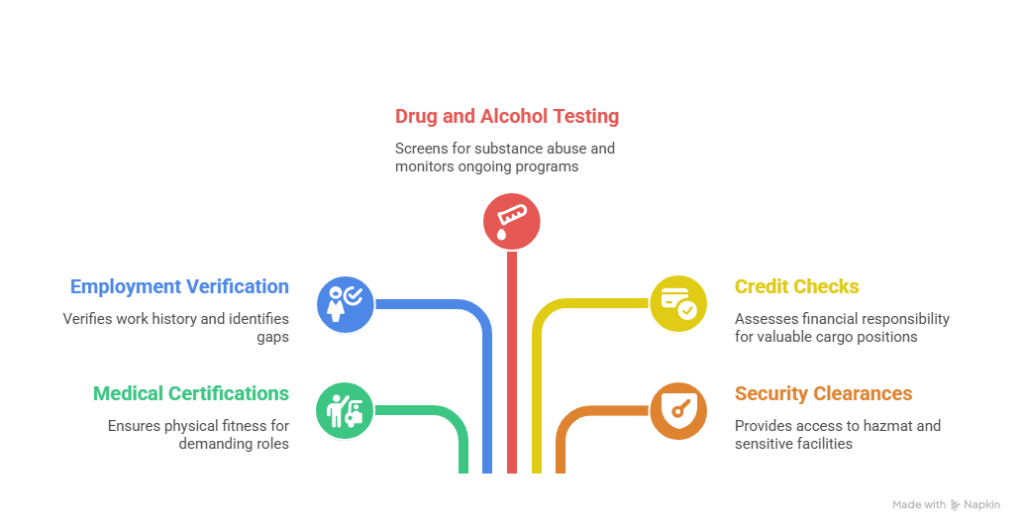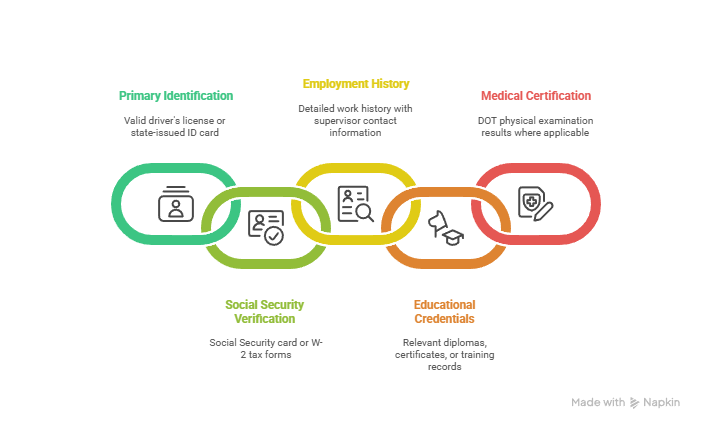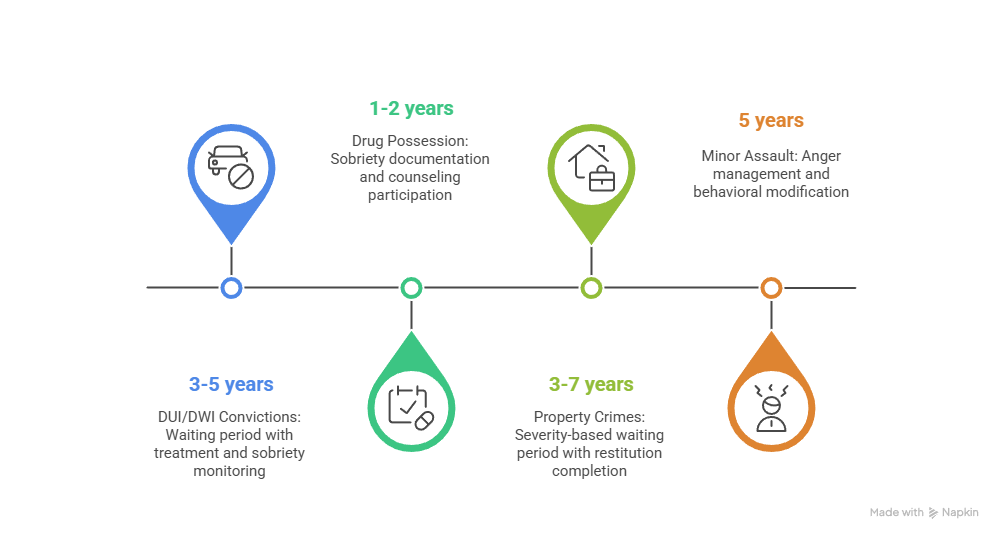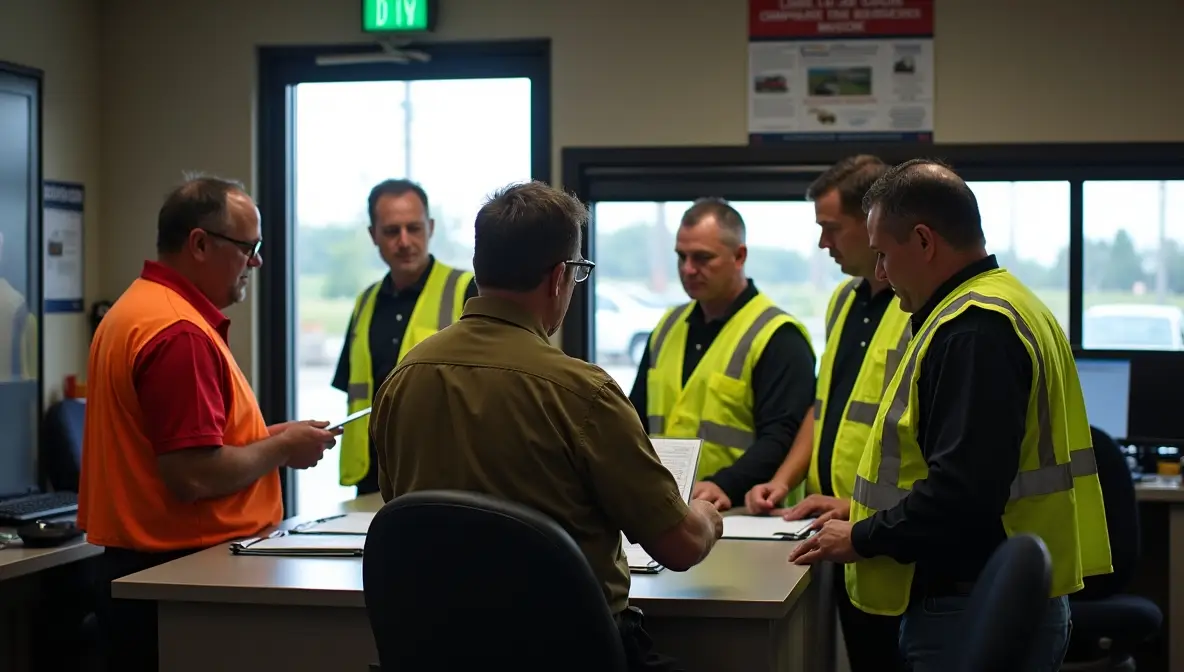Florida's transportation industry mandates comprehensive background checks administered by the Department of Highway Safety and Motor Vehicles (DHSMV) under Chapter 322 of the Florida Statutes, ensuring only qualified professionals operate commercial vehicles and work in safety-sensitive positions. These stringent screening processes protect public safety while maintaining industry standards across trucking, public transit, and specialized transportation roles.
Key Takeaways
- Florida transportation background checks are mandatory for commercial drivers, dispatchers, mechanics, and other industry professionals under DHSMV oversight
- Chapter 322 of the Florida Statutes establishes the legal framework for screening requirements, disqualifying offenses, and compliance standards
- Different transportation roles require tailored background check approaches, with hazmat drivers and school bus operators facing more rigorous screenings
- The Fair Credit Reporting Act (FCRA) protects applicants' rights during the screening process, including dispute resolution and adverse action notifications
- Technology integration is modernizing background check processes through digital platforms, biometric verification, and predictive analytics
- Costs typically range from $10-$100 per check, with completion times varying from 3-14 business days depending on scope and complexity
Introduction
Florida's bustling transportation sector serves as a critical economic engine, moving millions of passengers and billions of dollars in freight annually. The state's commitment to safety begins with thorough vetting of transportation professionals through mandatory background checks. These screenings ensure that truck drivers, bus operators, and support personnel meet strict safety and reliability standards. Understanding these requirements is essential for both job seekers entering the industry and employers maintaining compliant hiring practices.
Understanding Florida Transportation Background Check Requirements
Florida transportation background checks represent a comprehensive screening process designed to evaluate an individual's fitness for safety-sensitive positions. These mandatory assessments examine criminal history, driving records, employment eligibility, and medical qualifications to ensure public safety. The process serves as a critical gateway, determining who can operate commercial vehicles or work in supporting roles within the state's transportation infrastructure.
Furthermore, these background checks extend beyond basic criminal history searches. They include verification of professional licenses, educational credentials, and specialized certifications required for specific transportation roles. Additionally, the screening process evaluates financial responsibility through credit checks for positions involving monetary transactions or valuable cargo handling.
Legal Framework and Regulatory Authority
Chapter 322 of the Florida Statutes provides the foundational legal structure governing transportation background checks. The DHSMV serves as the primary enforcement agency, working alongside federal regulators like the Federal Motor Carrier Safety Administration (FMCSA) to establish uniform standards. This regulatory framework ensures consistency across state lines while addressing Florida-specific transportation needs and safety concerns.
Moreover, federal regulations play a crucial role in shaping state requirements. Interstate commerce regulations mandate specific screening protocols for drivers crossing state boundaries. These federal requirements often exceed state minimums, creating a comprehensive safety net for the transportation industry.
The regulatory landscape continues evolving as new safety concerns emerge. Recent updates include enhanced cybersecurity screening requirements for positions with access to digital transportation systems. Additionally, anti-terrorism measures have introduced additional background check components for drivers handling hazardous materials or operating in sensitive locations.
Scope of Background Investigations
Transportation background checks encompass multiple verification components beyond basic criminal history searches. The investigation scope varies significantly based on position type and associated risks:

- Medical Certifications: DOT physical examinations confirming fitness for demanding transportation roles
- Employment Verification: Accurate work history reporting and gap identification
- Drug and Alcohol Testing: Substance abuse screening and ongoing monitoring programs
- Credit Checks: Financial responsibility assessment for positions involving valuable cargo
- Security Clearances: Specialized clearances for hazmat drivers and sensitive facility access
Recent technological advances have expanded background check capabilities. Digital footprint analysis now examines social media activity for potential red flags. Continuous monitoring systems track ongoing compliance throughout employment tenure.
Types of Transportation Positions Requiring Background Checks
Every transportation role carries unique responsibilities and associated risks, necessitating tailored background check approaches. Commercial vehicle operators face the most stringent requirements due to their direct impact on public safety. Supporting personnel undergo modified screenings focused on their specific job functions and access levels. Specialized roles like hazmat transportation and school bus driving require additional security clearances and enhanced background investigations.
The transportation industry encompasses diverse career paths, each with distinct screening requirements. Entry-level positions may require basic background checks, while supervisory roles demand comprehensive investigations. Furthermore, positions involving interstate commerce face federal oversight requirements that exceed state minimums.
Commercial Driver Requirements
Commercial drivers represent the backbone of Florida's transportation industry, requiring thorough vetting before operating large vehicles. The screening process emphasizes traffic safety violations, substance abuse history, and criminal convictions that could compromise passenger or cargo security. Physical fitness requirements ensure drivers can safely operate vehicles for extended periods without endangering public safety.
Interstate commercial drivers face additional federal requirements under FMCSA oversight. These regulations mandate specific medical certifications and ongoing monitoring programs. Drivers crossing international borders require enhanced security clearances and passport verification.
| Position Type | Key Screening Elements | Medical Requirements | Processing Time |
| Long-haul Truckers | DOT medical exam, criminal history, driving record | DOT physical every 2 years | 7-10 business days |
| Local Delivery | Driving record, employment verification, drug testing | Standard DOT physical | 5-7 business days |
| Bus Operators | Passenger safety training, medical certification | Enhanced DOT physical | 7-10 business days |
| Taxi/Rideshare | Criminal background, driving record | Standard medical | 3-5 business days |
The screening timeline for commercial drivers typically spans 7-10 business days. However, complex cases involving multiple states or specialized clearances may require up to three weeks.
Transportation Support Personnel
Support personnel screening focuses on reliability, trustworthiness, and job-specific competencies rather than driving qualifications. These positions include dispatchers who coordinate logistics, mechanics who maintain vehicle safety, and warehouse staff who handle valuable cargo. Each role requires specific background check components tailored to associated risks and responsibilities.
Dispatchers undergo communication skills assessments alongside traditional background checks. Their role in coordinating emergency responses and managing driver safety requires exceptional reliability. Similarly, mechanics face enhanced screening due to their critical role in vehicle safety maintenance.
The screening process for support personnel includes several key components:
- Employment Stability: Consistent work history demonstrates reliability and commitment to transportation industry standards.
- Technical Competency: Relevant certifications and training records verification ensures qualified personnel in specialized roles.
- Security Clearance: Appropriate level based on facility access requirements and cargo handling responsibilities.
Warehouse personnel require specialized screening due to cargo security responsibilities. Positions involving high-value goods or sensitive materials face enhanced investigation requirements.
Specialized Transportation Roles
Specialized transportation positions demand the most rigorous background investigations due to unique safety and security concerns. Hazmat drivers transport dangerous materials requiring federal security threat assessments. School transportation workers undergo comprehensive child safety screenings including psychological evaluations. Airport ground transportation personnel face enhanced security requirements due to facility access needs.
These specialized roles often require multiple clearance levels and ongoing monitoring programs. The initial screening process can take several weeks due to comprehensive investigation requirements. Annual re-screening ensures continued compliance with evolving safety standards.
DHSMV Background Check Process
The DHSMV background check process follows a standardized approach designed to ensure thorough evaluation while protecting applicant rights. Initial application submission requires comprehensive documentation including personal identification, employment history, and medical certifications where applicable. The screening divides into three primary components: criminal history verification, driving record analysis, and employment eligibility confirmation.
Modern technology has streamlined many aspects of the background check process. Online application portals allow candidates to submit documentation electronically, reducing processing delays. Automated systems cross-reference multiple databases simultaneously, improving efficiency and accuracy.
Initial Application Requirements
Applicants must provide specific documentation to initiate the background check process. Valid government-issued photo identification serves as the primary identity verification document. Employment history spanning the previous three years requires detailed employer contact information and position descriptions. Medical examiner certificates are mandatory for commercial driving positions, demonstrating physical fitness for transportation duties.
The documentation requirements vary based on position type and associated risks. Entry-level positions may require basic identification and employment history. Specialized roles demand additional certifications and clearances before application processing begins.
Required documentation typically includes:

- Primary Identification: Valid driver's license or state-issued ID card
- Social Security Verification: Social Security card or W-2 tax forms
- Employment History: Detailed work history with supervisor contact information
- Educational Credentials: Relevant diplomas, certificates, or training records
- Medical Certification: DOT physical examination results where applicable
Incomplete applications delay the screening process significantly. Therefore, applicants should carefully review requirements before submission.
Screening Components and Timeline
Criminal history checks examine state and federal databases for disqualifying offenses over specified lookback periods. Driving record analysis reviews violations, license suspensions, and accident history to assess road safety risk. Employment verification contacts previous employers to confirm work history accuracy and identify any unreported employment gaps.
The screening process utilizes multiple verification methods to ensure accuracy. Automated database searches provide initial results, while manual verification confirms critical information. Cross-referencing multiple sources helps identify discrepancies or potential fraud attempts.
| Screening Component | Typical Timeline | Associated Costs | Verification Method |
| Criminal History | 2-3 business days | $15-$25 | Database search + manual review |
| Driving Records | 1-2 business days | $10-$15 | DMV database access |
| Employment Verification | 5-10 business days | $20-$35 | Direct employer contact |
| Professional Licenses | 2-4 business days | $10-$20 | Licensing board verification |
Most standard background checks complete within one week. Comprehensive screenings may require up to two weeks for final results.
Disqualifying Factors and Offenses
Florida transportation background checks identify specific criminal convictions and driving violations that permanently or temporarily disqualify candidates from transportation employment. Permanent disqualifications typically involve serious felonies like vehicular manslaughter, drug trafficking, or violent crimes against persons. Temporary disqualifications allow for rehabilitation periods before reapplication, encouraging workforce reentry while maintaining safety standards.
The disqualification framework balances public safety concerns with rehabilitation opportunities. Recent legislative changes have reduced lookback periods for certain non-violent offenses, reflecting evolving attitudes toward criminal justice reform. However, safety-sensitive positions maintain strict standards due to public trust requirements.
Permanent Disqualifications
Certain criminal convictions result in lifetime bans from transportation employment due to their severity and public safety implications. These permanent disqualifications reflect crimes that demonstrate fundamental incompatibility with transportation industry safety requirements. The severity of these offenses indicates behavior patterns that pose unacceptable risks to public safety and cargo security.
Permanent disqualifying offenses include:
- Homicide Convictions: First and second-degree murder, voluntary manslaughter
- Sexual Offenses: Rape, sexual assault, child molestation, indecent exposure
- Terrorism-Related Crimes: Material support for terrorism, explosive device possession
- Kidnapping/Abduction: Unlawful restraint, human trafficking, child abduction
- Arson: Intentional fire-setting with injury or property damage
These permanent bars reflect society's determination to maintain absolute safety standards in transportation. While rehabilitation is possible for many offenses, these crimes indicate risks too severe for public safety positions.
Temporary Disqualifications and Rehabilitation
Temporary disqualifications provide pathways for rehabilitation and workforce reintegration after specified waiting periods. These provisions recognize that many offenders can successfully rehabilitate and contribute positively to society. The waiting periods allow time for behavior change demonstration while maintaining appropriate safety precautions.
DUI convictions represent the most common temporary disqualification category. The waiting period reflects the serious safety implications of impaired driving while allowing eventual workforce reentry. Successful completion of treatment programs may reduce disqualification periods in some cases.
Different offense categories carry varying rehabilitation requirements:

- DUI/DWI Convictions: 3-5 year waiting period with treatment program completion and ongoing sobriety monitoring.
- Drug Possession: 1-2 years with documented sobriety and counseling participation demonstrating rehabilitation commitment.
- Property Crimes: 3-7 years based on severity and restitution completion showing responsibility acceptance.
- Minor Assault: 5 years with anger management program completion and behavioral modification evidence.
The rehabilitation approach encourages positive behavior change while maintaining public safety standards. Regular monitoring during waiting periods ensures continued compliance with legal requirements.
Employee Rights and Protections
The Fair Credit Reporting Act (FCRA) establishes comprehensive protections for transportation job applicants undergoing background checks. Employers must provide clear disclosure of background check intentions and obtain written consent before initiating screenings. Pre-adverse action notices give candidates opportunities to review and dispute potentially inaccurate information before final hiring decisions. Florida's "Ban the Box" legislation further protects applicants by prohibiting criminal history inquiries on initial job applications.
These protections ensure fair treatment while maintaining employer needs for safety and security. The balance between applicant rights and public safety requires careful navigation by both employers and job seekers. Recent court decisions have strengthened employee protections while clarifying employer obligations.
FCRA Compliance Requirements
FCRA compliance begins with proper notification and consent procedures before conducting background checks. Employers must provide standalone disclosure documents clearly explaining the background check process and candidate rights. Written authorization from applicants is mandatory before accessing personal information or conducting investigations.
If adverse employment actions result from background check findings, employers must provide specific notices including reporting agency information and dispute resolution procedures. The disclosure requirements ensure transparency throughout the screening process. Candidates must understand what information will be reviewed and how it might affect their employment prospects.
Proper FCRA compliance involves several critical steps:
- Pre-Screening Disclosure: Clear explanation of background check scope and purposes
- Written Authorization: Signed consent before any investigation begins
- Pre-Adverse Action Notice: Opportunity to review and dispute findings before final decisions
- Adverse Action Notice: Final notification with dispute rights and agency contact information
Violations of FCRA requirements can result in significant legal liability for employers. Therefore, strict compliance procedures protect both candidates and employers throughout the screening process.
Dispute Resolution Procedures
Incorrect information on background checks can significantly impact employment opportunities, making dispute resolution procedures critically important. The FCRA mandates specific timeframes and procedures for investigating and correcting inaccurate information. Applicants have the right to dispute any information they believe is incorrect, incomplete, or outdated. Background check companies must investigate disputes within 30 days and correct verified errors promptly.
The dispute process begins with written notification to the background check company identifying specific inaccuracies. Supporting documentation strengthens dispute claims and expedites resolution. Applicants can request copies of their background reports to identify potential errors before they impact employment decisions.
Effective dispute strategies include detailed documentation of errors with supporting evidence, written communication creating paper trails, and regular follow-up to monitor investigation progress. Successful dispute resolution can restore employment opportunities and prevent future complications from inaccurate information.
Industry-Specific Requirements
Different transportation sectors within Florida maintain unique screening requirements reflecting their distinct operational risks and regulatory environments. Trucking and freight operations emphasize DOT medical qualifications and interstate commerce compliance under FMCSA oversight. Public transit systems prioritize passenger safety through enhanced training requirements and customer service evaluations. School transportation demands the most rigorous screening due to child safety responsibilities and extended background investigation requirements.
Industry specialization reflects the diverse nature of Florida's transportation sector. Each segment faces unique challenges requiring tailored screening approaches. Regulatory oversight varies significantly between industries, creating complex compliance requirements for employers operating across multiple segments.
Trucking and Freight Transportation
Commercial trucking operations must comply with comprehensive DOT medical examination requirements ensuring drivers can safely operate large vehicles over extended periods. FMCSA regulations mandate regular review of safety records and disqualifying moving violations. Interstate commerce requirements add federal oversight layers, including compliance with hours-of-service regulations and electronic logging device mandates.
The trucking industry faces unique challenges due to interstate operations and cargo security requirements. Long-haul drivers spend extended periods away from direct supervision, requiring exceptional reliability and judgment. Cargo theft concerns necessitate enhanced background screening for drivers handling high-value shipments.
Trucking-specific screening requirements emphasize:
- Physical Fitness: Current DOT medical certification with appropriate restrictions and ongoing monitoring programs.
- Safety Performance: Clean driving record with minimal violations and comprehensive accident history review.
- Substance Abuse: Comprehensive drug and alcohol testing programs with random monitoring throughout employment.
- Interstate Compliance: Federal background check requirements and cross-state verification procedures.
Regular monitoring ensures ongoing compliance throughout employment tenure, not just at initial hiring. Electronic logging devices now provide real-time monitoring of hours-of-service compliance.
School Transportation Services
School bus drivers undergo the transportation industry's most comprehensive background screening due to their daily responsibility for child safety and welfare. FBI fingerprinting and child abuse registry checks eliminate candidates with any history of offenses against minors. These enhanced screenings include psychological evaluations and extended reference checks beyond standard employment verification.
Child safety requirements create the strictest screening standards in the transportation industry. Every aspect of a candidate's background receives scrutiny to ensure complete suitability for working with children. The investment in comprehensive screening reflects society's commitment to protecting vulnerable populations during transportation.
| Screening Component | Standard Transport | School Transport | Additional Requirements |
| Criminal History | 7-year lookback | Lifetime review | FBI fingerprinting |
| Child Abuse Registry | Not required | Mandatory | State and federal checks |
| Psychological Evaluation | Not required | Required | Professional assessment |
| Reference Verification | Basic employment | Extensive personal/professional | Enhanced background interviews |
These rigorous standards reflect society's commitment to protecting children while maintaining safe and reliable school transportation services.
Technology and Modernization Trends
Digital transformation is revolutionizing Florida transportation background checks through automated screening platforms and biometric verification systems. Cloud-based databases enable real-time cross-referencing across multiple jurisdictions and regulatory agencies. Artificial intelligence and predictive analytics identify potential risk patterns more effectively than traditional manual review processes. Blockchain technology promises enhanced security and verification capabilities for sensitive personal information storage and sharing.
Technology adoption accelerates as employers seek efficiency improvements and enhanced accuracy in screening processes. Modern systems reduce human error while improving consistency and reducing processing times. Digital platforms provide better audit trails and compliance documentation for regulatory purposes.
Integration of these technologies reduces processing times from weeks to days while improving accuracy. Mobile applications allow candidates to submit required documentation electronically, streamlining the initial application process. Automated notifications keep all parties informed of screening progress and completion status throughout the entire process.
Cost and Timeline Considerations
Florida transportation background check costs vary significantly based on screening scope and complexity requirements. Basic criminal history and driving record checks typically cost $25-$50 per candidate, while comprehensive investigations including employment verification and specialized clearances can exceed $150. Processing timelines range from 3-5 business days for standard screenings to 2-3 weeks for complex multi-state investigations.
Cost considerations extend beyond initial screening fees to include ongoing monitoring and periodic re-screening requirements. Employers must budget for both one-time hiring costs and recurring compliance expenses. Expedited processing services command premium pricing when urgent hiring needs arise.
Budget planning should account for both direct screening costs and indirect expenses such as staff time and training. Volume discounts may be available for large employers conducting multiple screenings monthly. Technology investments can reduce long-term costs through improved efficiency and reduced manual processing requirements.
Understanding pricing structures helps employers optimize screening budgets while maintaining appropriate safety standards. Some providers offer bundled packages that reduce per-check costs for comprehensive screenings. Annual contracts may provide volume discounts and predictable budgeting advantages for transportation companies with regular hiring needs.
Conclusion
Florida's transportation industry background check requirements under DHSMV oversight and Chapter 322 create a comprehensive safety framework protecting both industry workers and the traveling public. These mandatory screenings ensure only qualified, reliable professionals enter transportation careers while providing clear pathways for rehabilitation and workforce reentry. As technology continues modernizing the screening process, employers and job seekers must stay informed about evolving requirements and best practices. Success in Florida's transportation sector depends on understanding and embracing these rigorous safety standards as fundamental industry requirements that protect everyone on the road.
Frequently Asked Questions
What does a Florida transportation background check include?
A Florida transportation background check typically includes criminal history verification, driving record analysis, employment history confirmation, medical certification review, and drug/alcohol testing results. The specific components vary based on the transportation position and associated safety requirements.
How long does a Florida transportation background check take?
Standard Florida transportation background checks take 3-7 business days for completion. More comprehensive screenings involving multiple states or specialized clearances may require 10-14 business days depending on complexity and agency response times.
What criminal convictions disqualify someone from transportation jobs in Florida?
Permanent disqualifications include violent felonies, sexual offenses, drug trafficking, and terrorism-related crimes. Temporary disqualifications cover DUI convictions (3-5 years), minor drug offenses (1-2 years), and lesser violent crimes (5-7 years) with rehabilitation opportunities.
Can I dispute errors on my Florida transportation background check?
Yes, under the Fair Credit Reporting Act (FCRA), you can dispute inaccurate information by contacting the background check company directly. They must investigate your dispute within 30 days and correct any verified errors.
How much do Florida transportation background checks cost?
Costs range from $25-$50 for basic criminal and driving record checks to $100-$150 for comprehensive screenings including employment verification and specialized clearances. Employers typically bear these costs as part of their hiring process.
What are Level 1 and Level 2 background checks in Florida?
Level 1 checks involve name-based criminal record searches at the state level. Level 2 checks are more comprehensive, requiring fingerprinting and searching both state and national criminal databases, typically used for positions involving vulnerable populations.
Do arrests show up on Florida transportation background checks?
Yes, arrests may appear on background checks depending on the screening type and jurisdiction. However, employers must consider whether arrests are relevant to job performance and cannot automatically disqualify candidates based solely on arrest records without convictions.
How often must transportation workers undergo background checks in Florida?
Initial background checks are required before employment begins. Ongoing monitoring varies by position, with some safety-sensitive roles requiring annual re-screening. Employers establish specific policies based on regulatory requirements and risk assessments.
Additional Resources
- Florida Department of Highway Safety and Motor Vehicles
https://www.flhsmv.gov/ - Federal Motor Carrier Safety Administration Regulations
https://www.fmcsa.dot.gov/regulations - Fair Credit Reporting Act Compliance Guide - Federal Trade Commission
https://www.ftc.gov/business-guidance/resources/using-consumer-reports-what-employers-need-know - Florida Department of Law Enforcement Criminal History Records
https://www.fdle.state.fl.us/Criminal-History-Records/ - U.S. Department of Transportation Background Check Requirements
https://www.transportation.gov/civil-rights/disadvantaged-business-enterprise

GCheck Editorial Team
Meet the GCheck Editorial Team, your trusted source for insightful and up-to-date information in the world of employment background checks. Committed to delivering the latest trends, best practices, and industry insights, our team is dedicated to keeping you informed.
With a passion for ensuring accuracy, compliance, and efficiency in background screening, we are your go-to experts in the field. Stay tuned for our comprehensive articles, guides, and analysis, designed to empower businesses and individuals with the knowledge they need to make informed decisions.
At GCheck, we're here to guide you through the complexities of background checks, every step of the way.





